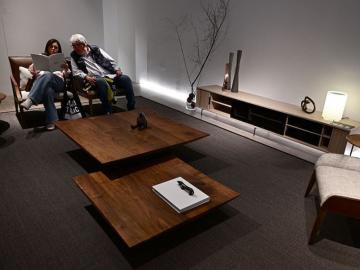Swanky homes, pools, gourmet meals: Co-living goes luxe and stylish
With a growing number of youth in the workforce and an influx of student population, who are prioritising quality accommodation, co-living startups are shifting from offering basic models to a premium lifestyle experience
At The Covie, the homes are fully-furnished, and residents can avail of nutrition measured meals, security-controlled rooms, and access work spaces along with a gym, and other exercise areas.
High-end furnishings, smart home technology, professional housekeeping, gourmet meals on demand, laundry at the doorstep, and 24/7 assistance by top hospitality professionals.
Welcome to the world of luxury co-living, where homes feel no less than swanky hotel rooms.
On the whole, the demand for co-living spaces in India has been on the rise since the end of 2021, says Vimal Nadar, head of research-India at a real estate consultancy, Colliers.
As of June 2021, the co-living space inventory, including luxury properties, exceeded 300,000 beds in India. In the next two years, the co-living segment is expected to cross 450,000 beds mainly driven by organised players. Even the occupancy levels are experiencing a recovery, increasing from 45 percent in 2020-2021 to 90 percent in 2022.
"Covid-19 severely impacted all asset classes including the co-living segment. However, post-pandemic we are seeing demand go up especially for branded players that offer luxury, more so because the younger ones with higher pay now prefer to live with all facilities," says Prashant Thakur, senior director and head of research at Anarock Group, a real estate consultancy.
As a result, top co-living operators are planning to increase their inventory by up to 20 percent by the end of 2023, reckons Nadar of Colliers. "Top players are likely to forge more tie-ups with universities, which would be a win-win situation," he says.
Homes like hotels
Sensing, and perhaps, fuelling the yearning for luxurious living, an increasing number of co-living companies are ready to offer a premium lifestyle experience in serviced and furnished spaces with superior options.Co-living startup Zolo was founded in 2015 with more than 500 properties spread across 10 cities and has raised a total of $98 million in funding over four rounds from investors including Investcorp, Nexus Ventures Partners, IDFC Alternatives, Trifecta Capital, and Mirae Assets.
Its latest addition, called Zolo Triloha, launched in August 2022, offers amenities such as fully-furnished rooms, a gym, a swimming pool, a breakfast buffet, housekeeping services, unlimited laundry service, and smart home technology among others. The rentals are also 50 percent higher at Rs 30,000 per month, inclusive of electricity, food, and other amenities.
“We chose to enter the premium segment because we found a gap in the market where mid to senior executives struggle to find homes when living in another city for long-term projects,” says Dr Nikhil Sikri, CEO and co-founder. “We wanted to create that high-end, technologically advanced, community feeling to deliver a home away from home for this category of consumers,” he adds.
Also read: Office spaces aren't going away; commercial real estate will be at the heart of economic recovery: Ankur Gupta
The space also hosts movie screenings, game nights, and barbeque evenings, bringing residents together. "People who prefer luxury co-living spaces are typically individuals who value convenience, community, and upscale living accommodations. These individuals may be professionals, urban nomads, or entrepreneurs who are looking for a supportive community to help them adjust to their new surroundings," Dr Sikri says adding that they have seen an overwhelming response post Covid-19 for co-living. “Not only are we back but we are seeing demand exceeding pre-pandemic in certain pockets," he adds.
Housr is another example of a hotel-like home. Founded in 2018, it started with the aim to fill the gap in the co-living space by introducing the luxury segment. It leases properties and remodels them according to the brand's standards for users to rent them on a long-term basis through the website. The company's operations are spread across three verticals, including fully-furnished rooms, studio spaces, and complete apartments, across 75-plus luxury properties, and 5,000-plus beds. Residents can avail of gourmet meals on demand, and live in plush apartments with professional housekeeping and 24/7 assistance, among other amenities.
“I figured there was a market opportunity for a much standardised product in the premium segment with modern amenities on the lines of a business-class hotel,” says Housr’s founder and CEO, Deepak Anand. “The accommodation is aimed at people with top-paying jobs, and professionals who prefer luxurious stay options,” he adds.
Currently operational in Gurugram, Pune, Hyderabad, and Bengaluru, its monthly rentals range between Rs 35,000 and Rs 40,000 for studio apartments. For Housr Homes--the 1, 2, and 3BHK fully-furnished apartments—the rentals are anywhere between Rs 50,000 and Rs 300,000 per month. These are inclusive of professional housekeeping, high-speed Internet connectivity, doorstep laundry, and regular community events.
"In the past six months, the luxury co-living segment has seen a surge of nearly 20 percent," says Anand.
By the end of 2023, it is set to expand by up to 20,000 beds by launching more properties in the existing cities and venturing into new ones such as Goa, Vizag, Chandigarh, Jaipur, Lucknow, and more. It has also raised two funding rounds in the past years and expects another series B funding soon.
"The digital nomads of the world have had a taste of next-generation shared living and are unlikely to give it up. Luxury co-living spaces have reimagined how people live together and pioneered a revolution in urban living," says Anand.
Like Housr, luxury co-living space The Covie understood that millennials wanted more than just the basics. Launched in December 2020, their fully furnished homes have been on offer along with state-of-the-art meeting spaces, nutrition-measured meals, security controlled-homes, and a subscription model that permits residents to stay at any property inter-city or intra-city. The properties also have a dedicated gym and yoga areas besides dedicated spaces to work and socialise.
The properties are available in different configurations like single and double occupancy rooms, studio rooms, and 1 and 2 BHK units. As compared to rental options, users get the advantage of easy sign-up, a short lock-in period, and a minimum deposit.
"We are seeing that youngsters don't mind shelling out on their comfort when they get other conveniences at their doorstep and an added advantage of personal yet social spaces," says the founder, Swapnali Bhosale Kadam.
Present in Mumbai, Pune, Delhi, Gurugram, and Bengaluru, the brand is working on providing an additional 10,000 beds in the next 72 months.
Also read: Realty Bites: Homebuyers pay a heavy price for incomplete houses
Bridging the gap
For young professionals, students, or those on a budget, a co-living space, including the luxury segment, works out over the restrictions and hassles of rented apartment for various reasons. Dr Sikri of Zolo explains. For starters, they are cost-effective. In most cases, they turn out to be a more affordable option as they include utilities and amenities in the rent. It also does not demand hefty security deposits and eliminates any third-party such as brokers who are usually involved in the house-hunting process.
Additionally, unlike the usual 11-month lease for a rented apartment, even luxury co-living spaces offer flexible lease terms, which can be helpful if a tenant is unsure about how long they will be staying in a particular city and want to avoid long-term commitments. This is particularly helpful for executives living away from home for mid to long term projects, says Dr Sikri.
Most importantly, like co-living, luxury spaces also offer a chance to meet and live with like-minded individuals, lending a sense of community and avoiding feelings of loneliness.
Palak Bhatt, a marketing professional with an MNC, says this is the biggest reason drawing her to the idea of picking a co-living space over a rented apartment.
"I get to visit my family only once a month. And it's hardly easy to make friends in a new city," says the 32-year-old. "A co-living space will warm me up to the idea of living away from home, give me a sense of security and community along with giving me all the luxuries without having to spend my time or energy in setting them up," she adds.
And, with amenities such as homes being fully furnished, high-speed internet, and more, they are often more convenient as a resident doesn't have to worry about the hassle of setting up utilities or purchasing furniture.
Seeing these advantages, the concept is now also taking root in smaller cities such as Lucknow, Jaipur, Coimbatore, and Mysore that are witnessing a large student and younger workforce population, informs Thakur of Anarock.
But, he adds, the luxury co-living segment will prosper as long as each brand will create a differentiator.
Meanwhile companies are working towards closing the demand and supply gap. Take for instance, Hyderabad One, an upcoming 47-storey luxury co-living space that will be operational by 2026, as per Bhavishya Gupta, founder and managing director of Sensation Infracon Private Limited, which is developing the project. The under-construction project will house 1,928 deluxe rooms available for monthly rent starting from Rs 26,000 to Rs 36,000. At a subsidised and additional charge, other amenities such as an infinity pool, an underwater gymnasium, a spa, a salon, food and beverage outlets, gaming zones, bars, and more can be availed of, informs Gupta.
"We are located in the hub of Hyderabad's financial district and are surrounded by companies such as Microsoft, Amazon, Accenture, and Google. We have received many inquiries for corporate tie-ups with companies wanting the entire floor," says Gupta. "The demand for luxury co-living is high, but the supply is still not adequate. My experience in real estate says that this [luxury co-living] is going to be the next big thing," he adds.
Check out our Festive offers upto Rs.1000/- off website prices on subscriptions + Gift card worth Rs 500/- from Eatbetterco.com. Click here to know more.
Post Your Comment














